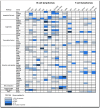What Does This Mutation Mean? The Tools and Pitfalls of Variant Interpretation in Lymphoid Malignancies
- PMID: 29677173
- PMCID: PMC5979354
- DOI: 10.3390/ijms19041251
What Does This Mutation Mean? The Tools and Pitfalls of Variant Interpretation in Lymphoid Malignancies
Abstract
High throughput sequencing (HTS) is increasingly important in determining cancer diagnoses, with subsequent prognostic and therapeutic implications. The biology of cancer is becoming increasingly deciphered and it is clear that therapy needs to be individually tailored. Whilst translational research plays an important role in lymphoid malignancies, few guidelines exist to guide biologists and routine laboratories through this constantly evolving field. In this article, we review the challenges of interpreting HTS in lymphoid malignancies and provide a toolkit to interpret single nucleotide variants obtained from HTS. We define the pre-analytical issues such as sequencing DNA obtained from formalin-fixed and paraffin-embedded tissue (FFPE), the acquisition of germline DNA, or the bioinformatic pitfalls, the analytical issues encountered and how to manage them. We describe the main constitutional and cancer databases, their characteristics and limitations, with an emphasis on variant interpretation in lymphoid malignancies. Finally, we discuss the challenges of predictions that one can make using in silico or in vitro modelling, pharmacogenomic screening, and the limits of those prediction tools. This description of the current status in genomic interpretation highlights the need for new large databases and international collaboration in the lymphoma field.
Keywords: lymphoid malignancies; next-generation sequencing; variant interpretation.
Conflict of interest statement
The authors declare no conflict of interest.
Figures

References
-
- Pastore A., Jurinovic V., Kridel R., Hoster E., Staiger A.M., Szczepanowski M., Pott C., Kopp N., Murakami M., Horn H., et al. Integration of gene mutations in risk prognostication for patients receiving first-line immunochemotherapy for follicular lymphoma: A retrospective analysis of a prospective clinical trial and validation in a population-based registry. Lancet Oncol. 2015;16:1111–1122. doi: 10.1016/S1470-2045(15)00169-2. - DOI - PubMed
-
- Morschhauser F., Salles G., McKay P., Tilly H., Schmitt A., Gerecitano J., Johnson P., Le Gouill S., Dickinson M.J., Fruchart C., et al. Interim Report from a Phase 2 Multicenter Study of Tazemetostat, an Ezh2 Inhibitor, in Patients with Relapsed or Refractory B-Cell Non-Hodgkin Lymphomas. Hematol. Oncol. 2017;35:24–25. doi: 10.1002/hon.2437_3. - DOI
-
- Roy S., Coldren C., Karunamurthy A., Kip N.S., Klee E.W., Lincoln S.E., Leon A., Pullambhatla M., Temple-Smolkin R.L., Voelkerding K.V., et al. Standards and Guidelines for Validating Next-Generation Sequencing Bioinformatics Pipelines: A Joint Recommendation of the Association for Molecular Pathology and the College of American Pathologists. J. Mol. Diagn. 2018;20:4–27. doi: 10.1016/j.jmoldx.2017.11.003. - DOI - PubMed
-
- Li M.M., Datto M., Duncavage E.J., Kulkarni S., Lindeman N.I., Roy S., Tsimberidou A.M., Vnencak-Jones C.L., Wolff D.J., Younes A., et al. Standards and Guidelines for the Interpretation and Reporting of Sequence Variants in Cancer: A Joint Consensus Recommendation of the Association for Molecular Pathology, American Society of Clinical Oncology, and College of American Pathologists. J. Mol. Diagn. 2017;19:4–23. doi: 10.1016/j.jmoldx.2016.10.002. - DOI - PMC - PubMed
-
- Jennings L.J., Arcila M.E., Corless C., Kamel-Reid S., Lubin I.M., Pfeifer J., Temple-Smolkin R.L., Voelkerding K.V., Nikiforova M.N. Guidelines for Validation of Next-Generation Sequencing-Based Oncology Panels: A Joint Consensus Recommendation of the Association for Molecular Pathology and College of American Pathologists. J. Mol. Diagn. 2017;19:341–365. doi: 10.1016/j.jmoldx.2017.01.011. - DOI - PMC - PubMed
Publication types
MeSH terms
Substances
LinkOut - more resources
Full Text Sources
Other Literature Sources

